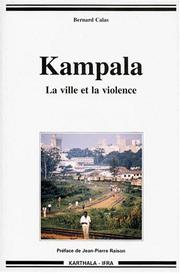| Listing 1 - 2 of 2 |
Sort by
|

ISBN: 1136532412 113653248X 1315017369 9781315017365 9781136532412 9780415329989 9781136532481 9781136532559 1136532552 0415329981 9780415329989 9781138861916 113886191X Year: 2004 Publisher: Oxon [England] : Routledge,
Abstract | Keywords | Export | Availability | Bookmark
 Loading...
Loading...Choose an application
- Reference Manager
- EndNote
- RefWorks (Direct export to RefWorks)
This study analyses the way in which tribal ties are maintained in the development of a tribally mixed, middle class community in Kampala, Uganda. Political independence in the early nineteen sixties in much of Africa created expectations of increased development, education and living standards. There was hope that ethnic tensions arising from false colonial boundaries might be transcended by newly emerging socio-economic status-groups. However, the new national boundaries suddenly made aliens of peoples who had migrated and settled in towns distant from their home countries. The interplay of
Tribes --- Tribes and tribal system --- Families --- Clans --- Kampala (Uganda) --- Горад Кампала (Uganda) --- Horad Kampala (Uganda) --- Кампала (Uganda) --- Καμπάλα (Uganda) --- 캄팔라 (Uganda) --- K'amp'alla (Uganda) --- IKampala (Uganda) --- קמפלה (Uganda) --- Ḳampalah (Uganda) --- Kanpala (Uganda) --- カンパラ (Uganda) --- Kanpara (Uganda) --- Kaempaala (Uganda) --- Kambaala (Uganda) --- Kampal (Uganda) --- קאמפאלא (Uganda) --- 坎帕拉 (Uganda) --- Social conditions.

ISBN: 2865378055 Year: 1998 Publisher: Paris Karthala
Abstract | Keywords | Export | Availability | Bookmark
 Loading...
Loading...Choose an application
- Reference Manager
- EndNote
- RefWorks (Direct export to RefWorks)
Sociology of environment --- Social geography --- Kampala --- Violence --- Kampala (Uganda) --- Kampala (Ouganda) --- Politics and government. --- Social conditions. --- Politique et gouvernement --- Conditions sociales --- Violent behavior --- Social psychology --- Горад Кампала (Uganda) --- Horad Kampala (Uganda) --- Кампала (Uganda) --- Καμπάλα (Uganda) --- 캄팔라 (Uganda) --- K'amp'alla (Uganda) --- IKampala (Uganda) --- קמפלה (Uganda) --- Ḳampalah (Uganda) --- Kanpala (Uganda) --- カンパラ (Uganda) --- Kanpara (Uganda) --- Kaempaala (Uganda) --- Kambaala (Uganda) --- Kampal (Uganda) --- קאמפאלא (Uganda) --- 坎帕拉 (Uganda)
| Listing 1 - 2 of 2 |
Sort by
|

 Search
Search Feedback
Feedback About UniCat
About UniCat  Help
Help News
News